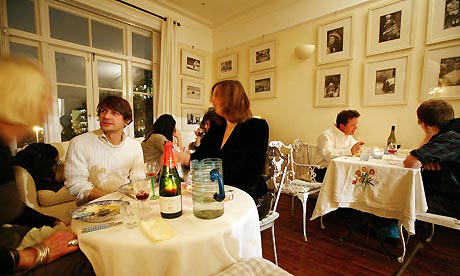
Last week, I read an article on 24 Hours which discussed about an increasing trend for underground restaurants. This is appears to be a new operating systems on top of all existing style of business entities. Local chefs will hold invitation-only dinner sessions frequently at their houses, and the guests will pay by donation. According to Robin (a chef who operates with the underground restaurant dining system), the founder of Swallow Tail, the goal is to build a sense of intimacy between strangers, and promote unity within the community.
It is interesting to think about this creative approach that aims to increase the communication between strangers, because the notion of underground restaurant seems to lie between a business, and a supportive group or club. Because it is not officially registered as a business, and the owners are not trying to maximize their profit, by legal means, underground restaurants are not considered as a business. On the other hand, underground restaurants operates with a clear goal or value proposition, which claims that they will increase people’s connection, and contribute to the unity within a community. This coincides with the idea of social entrepreneurship, which focuses on the well-being of the society, and operates to increase social benefits and to support local community. The general impression or stereotypical view that people have about business firms is that they aim to maximize their profit, and sometimes, they will even oppose moral codes to achieve their desire result. The presence of social entrepreneurs and owners of underground restaurants seems to reflect a changing trend in the business world. Earning profit becomes subjected to the values and beliefs of the company, as consumers believe that companies should undertake more social responsibilities other than making profit.
Nevertheless, I also find this underground restaurant idea a bit contradictory to its goal of increasing communication between strangers. Not to mention that only limited number of people can fit in a house, the invitation-only nature of the fest limits the access of the feast to selective group of people. It is understandable that the chefs want to ensure the security for his/her guests, however, this implies that the selection of guests result from the owner’s preference, which could be rather biased. How do we know who will be invited, how can we be added to the list, what are the criteria that owners use to make their choices are all questions that is waiting to be answered, and clarified by owners of this new, arising trend.
I have made a very quick assumption that the owners have enough money to support themselves when I saw the idea of underground restaurant. Money may not the only important thing in life; however, it is essential to the extent that one will not be able to survive comfortably without its presence. Therefore, the increasing popularity of this type of events or activities could mean that people are trying to increase their living standards, and to increase communication within the society, with the pretext that they are supported by adequate amount of income and free time.
URL: http://imonlyhereforthefood.com/2010/05/swallow-tail-super-club-underground-restaurant/
http://www.guardian.co.uk/lifeandstyle/2009/feb/10/underground-restaurants-london


